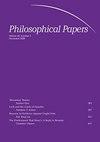刻画想象力的态度
IF 1.3
3区 哲学
0 PHILOSOPHY
引用次数: 1
摘要
有三种思想强烈地影响了最近的感官想象工作,通常没有明确的表达。意象思想认为所有涉及到意象的心理状态都是想象性的。态度思想认为,如果存在一种独特的想象态度,那就是一种单一的、整体的态度。功能思想认为,感觉想象的功能与其他精神状态,如判断或信仰的功能相同或相似。综合起来,这些思想创造了一个理论背景,在这个背景下,消除主义显得很有吸引力。消除主义认为,我们不需要参考一种独特的态度来表征感官想象:其他状态中涉及的态度提供了我们所需的所有资源。彼得·朗兰-哈桑对感官想象的描述提供了这种消除主义的一个例子。通过对这一叙述的仔细考察,我揭示了这三种思想及其支持消除主义的共同倾向。我认为这三者都是可疑的,我们应该拒绝排除主义;如果我们要充分解释感官想象,我们需要一种独特的想象态度。本文章由计算机程序翻译,如有差异,请以英文原文为准。
Characterizing the Imaginative Attitude
Abstract Three thoughts strongly influence recent work on sensory imagination, often without explicit articulation. The image thought says that all mental states involving a mental image are imaginative. The attitude thought says that, if there is a distinctive imaginative attitude, it is a single, monolithic attitude. The function thought says that the functions of sensory imagination are identical or akin to functions of other mental states such as judgment or belief. Taken together, these thoughts create a theoretical context within which eliminativism appears attractive. Eliminativism is the idea that we need not refer to a distinctive attitude in order to characterize sensory imagination: the attitudes involved in other states provide all the resources we need. Peter Langland-Hassan’s account of sensory imagination provides an example of such eliminativism. Via close examination of this account, I make manifest the three thoughts and their collective tendency to support eliminativism. I argue that all three are dubious, and that we should reject eliminativism; we need a distinctive imaginative attitude if we are to adequately explicate sensory imagination.
求助全文
通过发布文献求助,成功后即可免费获取论文全文。
去求助
来源期刊

Philosophical Papers
PHILOSOPHY-
CiteScore
2.10
自引率
0.00%
发文量
18
期刊介绍:
Philosophical Papers is an international, generalist journal of philosophy edited in South Africa Original Articles: Articles appearing in regular issues are original, high-quality, and stand-alone, and are written for the general professional philosopher. Submissions are welcome in any area of philosophy and undergo a process of peer review based on initial editor screening and refereeing by (usually) two referees. Special Issues: Topic-based special issues are comprised of both invited and submitted papers selected by guest editors. Recent special issues have included ''Philosophy''s Therapeutic Potential'' (2014, editor Dylan Futter); ''Aging and the Elderly'' (2012, editors Tom Martin and Samantha Vice); ''The Problem of the Criterion'' (2011, editor Mark Nelson); ''Retributive Emotions'' (2010, editor Lucy Allais); ‘Rape and its Meaning/s’ (2009, editor Louise du Toit). Calls for papers for upcoming special issues can be found here. Ideas for future special issues are welcome.
 求助内容:
求助内容: 应助结果提醒方式:
应助结果提醒方式:


